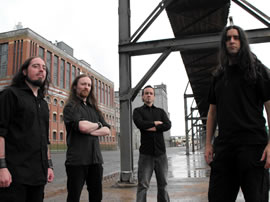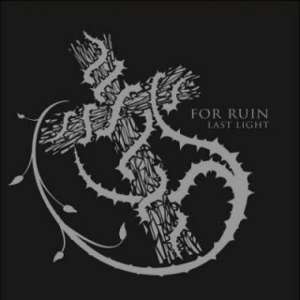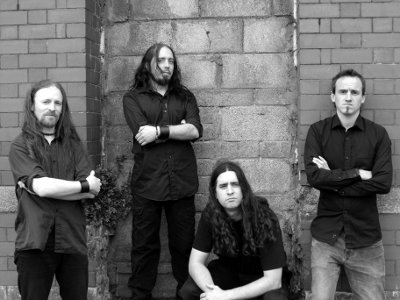Interviews
For Ruin
Interview with: John and Pete of the Irish metal band - For Ruin
2010-01-17

 I would like to start by congratulating you on your new album.
I would like to start by congratulating you on your new album.
John: Hi Dolev, thanks for the interview and your kind words - happy New Year to you! Its nice to have
Last Light out at last (it took a long time to mix) and we are very pleased with it!
Can you tell me about the band?
John: Sure –
For Ruin was formed in 2002 or 2003 in Cork, on the southern coast of Ireland. At that time, it was just a one-man project – just me on my own. I released 3 demos during '04 -‘06 which gained some label interest, culminating in a deal with Sentinel Records in early 2007. We released our debut album “December” in October '07, and it has done well for us – it's well distributed by now (including digitally) and while the production on it could be better for a variety of reasons, it's a good representation of the early sound of the band – all albums are an audio-picture of where a band is at a particular time, and for us it is still early days – but that's the first proper documentation of the band. We've played with some of the biggest names in extreme music since then and now our second album Last Light is out since October last – it was preceded by a digital-only EP called “Enlightened”. Our lineup now consists of Pete Alcorn on drums, Drew Myers on guitar, Pete Lawlor on the bass and I'm on guitar and vocals.
What has driven you to take the un-commercial route and play old school black/death metal?
John: I guess its just that's the style of music we all share a love of and enjoy playing most. I play other styles of music too but extreme metal is my real musical drive, my passion I suppose. When we start writing music this is just what comes out! I listen to many styles of metal (as well as non-metal music) and this is still top of the heap for me, even now at 34 years of age you might think I would know better!
Pete: I've played in extreme metal bands on and off since I was 17 or 18 so its something in the blood as the saying goes. I'm not trying to make a living from music so it leaves me free to play the music I really love. If I ever did want or have to turn music into money to be honest metal is not the way to do it.
What are the bands influences?
Pete: We all bring our own influences to the music. For me
Death
,
Atheist, the 90's
Peaceville doom death bands like
Anathema &
Paradise Lost, grind-core and Swedish death metal right up to present day stuff like Mastodon. That's just the metal part! I listen to pretty much everything.
John: The band plays a style that incorporates elements of many types of extreme music, but always with a strong emphasis on harmony and melody – some have mentioned that they hear traces of
Rotting Christ
, Dissection,
Death, Amorphis and Katatonia in our music. I believe that the band has its own style and people find it useful to use comparisons with other bands when describing a band so people can get some idea of the sound. I have written most of the music for the band so far and I certainly listen to all of those bands and more. But influences come from many places for us, not only from music – they come from our lives, culture, history, politics, surroundings, the people around us and elsewhere and I think that's important – particularly for the lyrical side of the band.
You were signed in Sentinel records but then you decided to give it up, and do the whole thing by yourselves. What were the reasons for that move? Did it change the atmosphere in the band? Are you looking for a new record company?
John: Times have changed and our old label had the same problem that businesses the world over has had and while they are still going, we decided we'd keep control of Last Light ourselves – nobody would push the album as hard as we could because we believe in it and really want it to be heard. While we are still a relatively unknown band, we have a lot of contacts and networks ourselves. It meant that we funded the album's costs entirely ourselves and have learned from that and know-how to do it now – right through from song-writing to artwork, design and merchandising. Everything about the album is under our control and that's a unique position to be in. In means that distribution is compromised a little for sure and that all costs are ours, but at least all the rights are ours and the ball is firmly in our court. It was nice that we were all unified behind the decision in the band and were in a position to release it ourselves. We are not looking for a label right now, but we may license the album to a label to enhance distribution and help with touring – we are working on that right now in fact. Even if we were looking for a deal I'm sure it would be very difficult given the way that the music industry is going right now with shops and labels closing everywhere. The music industry is in a state of flux and nobody is quite sure how it will end up I think!
Pete: We just wanted 100% control over the album and how it would be released. If anything, it created a more focused atmosphere. We realized that we would have to do it all ourselves, but then, instead of a label splitting promotion across its catalogue, we have 4 people concentrating on 1 album. This is easier in a lot of ways, once you have a plan of how it's going to be done. This way we can move in any direction in case of future changes.
 Can you tell me more about the Irish metal scene? Is it influenced by the famous British scene, or does it have a style of its own?
Pete:
Can you tell me more about the Irish metal scene? Is it influenced by the famous British scene, or does it have a style of its own?
Pete: Id say the Irish metal scene is influenced by the Scandinavian and English scenes most, but musically Ireland is a bit of a crossroads for metal. There is a lot of interesting bands of all metal styles here. The geography has helped bands to create their own sound as well as keeping the scene out of reach of influences sweeping across the continent.
John: The Irish scene stands on its own I think. There is of course influences (like there are globally) from the great metal bands like Sabbath, Maiden etc, but for us the UK influences would come from Paradise Lost, Anathema etc. I wouldn't say that Ireland is a great place to be growing a metal band – it's ok, and has its benefits and drawbacks. There's a lot of metal fans (casual and otherwise) in Ireland – Metallica plays here every year lately it seems to 30k people or something and others in the big-leagues do well too. The underground, or lets say “proper” metal shows are much smaller, with a fan-base of less that 1000 people I'd say. Festivals here have struggled in the recession (which hit Ireland harder than many), numbers are down at gigs, CD shops are closing and business is down. Bands are not unaffected by this. It's not a great time to be putting out albums in Ireland or anywhere really. But there is a core of fans in Ireland that are pretty decent and loyal – its just that everyone has extra costs and lower incomes at the moment. We fool ourselves here into thinking we can put on 2-day festivals when we can't, especially at the moment. There are some decent bands in Ireland from various styles within the extreme metal spectrum and some are fairly well known now abroad. Irish bands seem a little strange to the outside world – metal from an island on the north west of Europe is an oddity to many international fans who know Ireland from a whole range of clichés and from a musical perspective – U2 and many other highly successful radio-friendly artists. We have too many gigs over here at the moment, probably too many crap bands and the local gig-goer is tired of seeing them play week after week so they are selective, and rightly so. Cork has really suffered from this, and Dublin too (although there is a larger pool of people in Dublin). Being a metal band in Ireland can be very tough. There's a shortage of musicians, venues, and the scene is very small. However this has led to some very unique bands like Primordial, Mael Mordha and others, as our isolation keeps the scene here very fresh. It has pros and cons like any country. In so far a logistics it is obviously expensive and awkward to play abroad. Ireland has always had a very strong musical tradition so that has definitely carried over into the metal scene here.
What are the bands future plans? Any upcoming tour?
We are working on a short UK tour for the spring now and we will hopefully get to Europe later in the year and we have hopes for some festival slots too. Touring is expensive of course and without label support its tough, but we are going to do our best to get out there and push the album internationally this year.
Have you heard of any bands from Israel? Will you be planning a future show here?
John: We would love to get down to you of course – but it will be in the future and when economic conditions are better looking I think. I used to listen to
Orphaned Land quite a bit when their first album - "Sahara" came out but I have not followed their progress – they were a good band, I must check them out again! I listen to
Melechesh
quite a bit, and saw them last year in Hellfest – great band! Make me some recommendations please!
Pete: I haven't heard as many as I'd like to but Orphaned Land and Melechesh are two that I quite like. I also love middle-eastern music as it shares the same melencholic quality of Irish traditional music, and when incorporated into metal it can be very effective. I'd love to visit Israel not only to play but to absorb some of the history and culture.
Back to the album, though I really like it, your material has nothing new to show. Do you think that there is a place for innovation in heavy metal, and especially the black metal scene?
Pete: There's always a place for innovation and invention in metal. We don't really plan songs with a set idea of what is going to happen. There are some very innovative bands in the BM scene, like Enslaved and the even the Emperor albums were pushing boundaries at the time. We just try to incorporate our influences from across the history of metal and if it works then all the better. We'll keep doing what we do and push the variety of styles rather than any novelty factor's we could introduce.
John: I don't agree that there is nothing new in our material – of course it is difficult to be truly innovative, particularly when creatively a band is still finding its feet as we are – but all bands lean on their influences, particularly at the early phase of their careers. I hear fewer influences from our peers on Last Light than I did in the past and the new songs we are writing show even more of this which I think is a good progression for a band – these things take some time I guess. Metal is constantly evolving and growing on its roots, spreading out and changing. Some changes are bad (nu-metal!), and some are more positive.
 And now the taste test:
- Iron Maiden or Judas Priest?
John:
And now the taste test:
- Iron Maiden or Judas Priest?
John: Maiden
Pete: Not a fan of either to be honest but if pushed I'd pick Maiden, unless you include Venom or
Motörhead, which are a lot more my thing!
- Metallica or Megadeth?
John: Megadeth, though old Metallica was great and the new one was passable. Didn't like the new Megadeth album, or anything since "Countdown To Extension" really…
Pete: Metallica. The first four Metallica albums are still some of the greatest ever recorded, shame about how bad they got!
- Cold beer or a 50 year old whiskey?
John: Whiskey!
Pete: Both!
- Dimmu Borgir or Mayhem?
John: Neither really, I love De Mysteriis, but the rest of Mayhem's stuff is not for me. Not a big DB fan either though the Deathcult album was good.
Pete: I've never got the appeal of Mayhem, they sound like they're falling down a stairs so Dimmu Borgir for me (sorry Mayhem fans)!
- steak or cheeseburger?
John: Steak
Pete: Steak every time! With the beer from above!
- Carcass or Death?
John: Too tough! Death I guess, true innovators, Carcass were great. I'm lucky I got to see both bands live!
Pete: Death, though Carcass are very close!
Thank you! Keep it old school!
Thanks for the interview! Stay in touch with us at
our website
Dolev Zaharony

 I would like to start by congratulating you on your new album.
I would like to start by congratulating you on your new album. Can you tell me more about the Irish metal scene? Is it influenced by the famous British scene, or does it have a style of its own?
Can you tell me more about the Irish metal scene? Is it influenced by the famous British scene, or does it have a style of its own? And now the taste test:
And now the taste test: